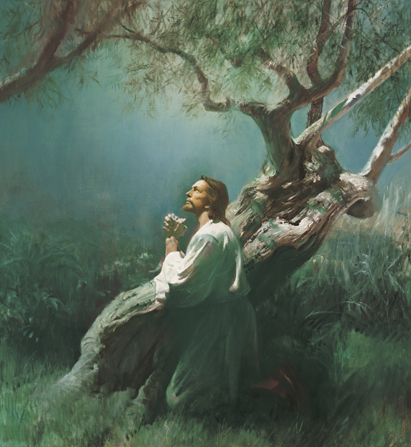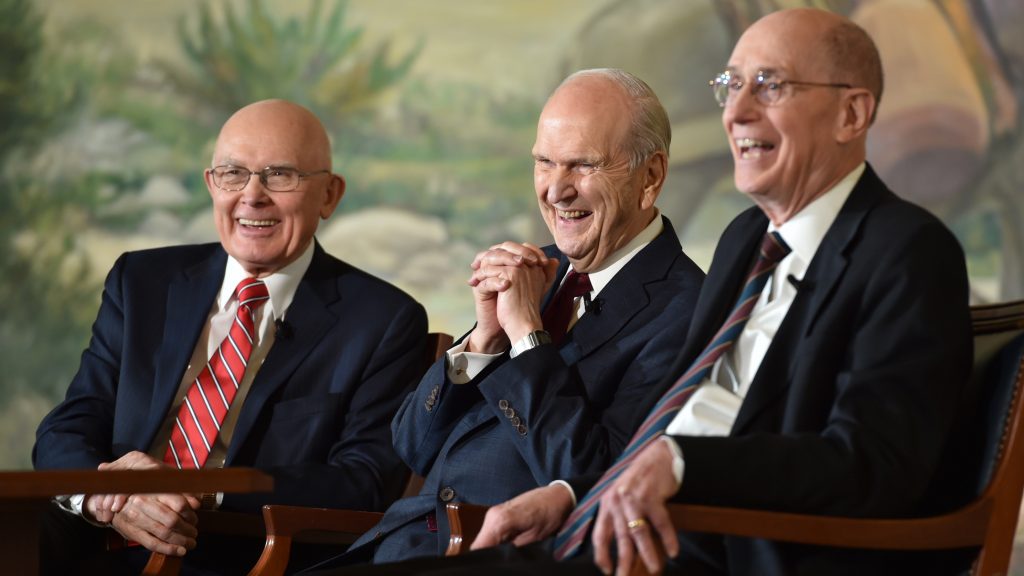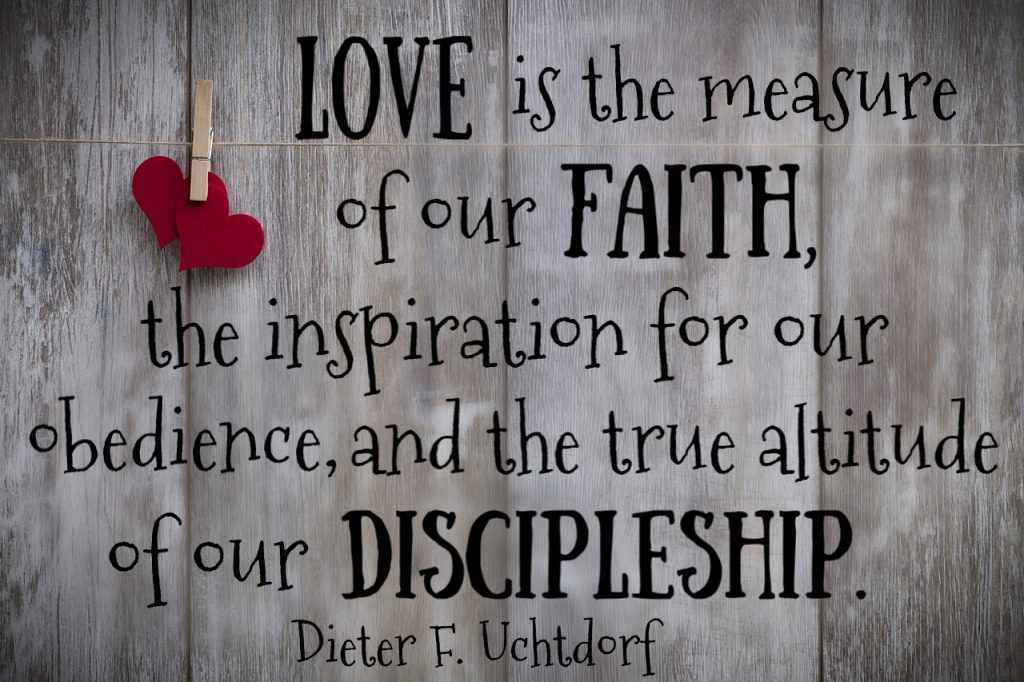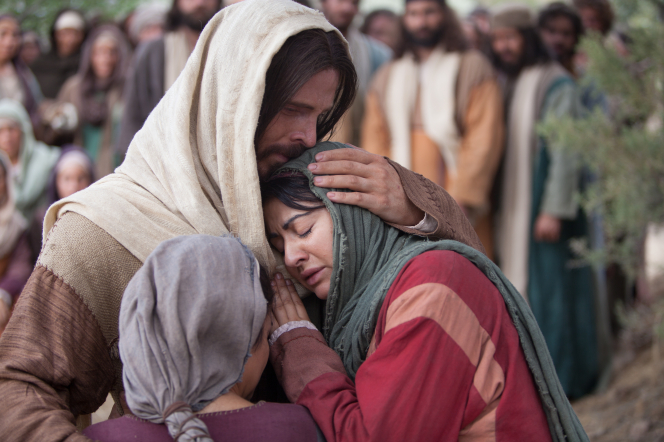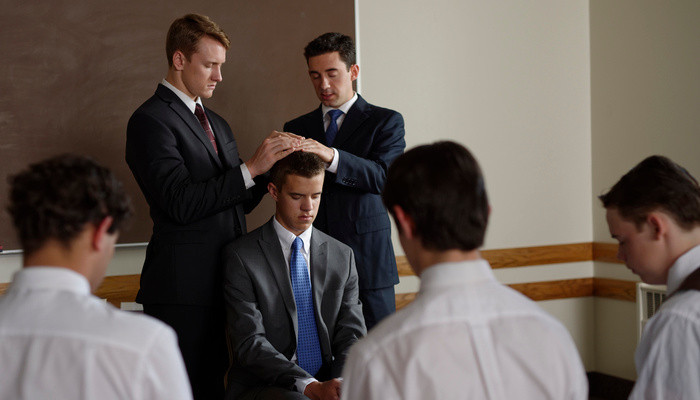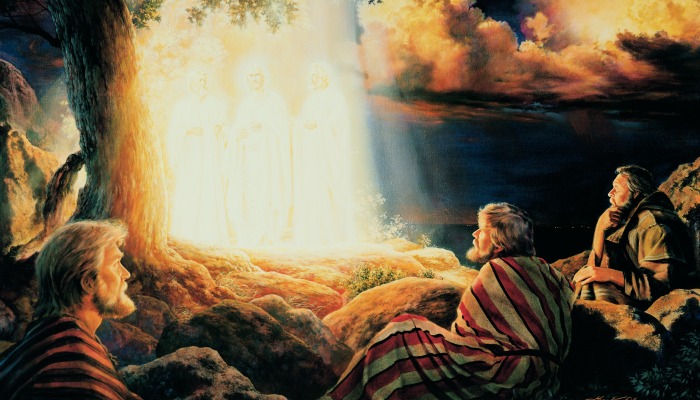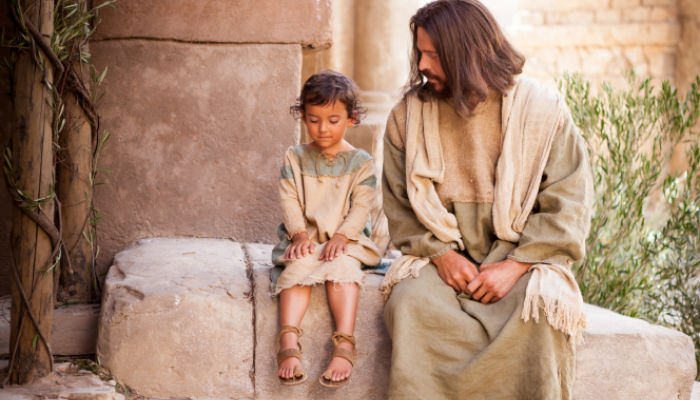
Why the Prophet Can’t Change the Commandments
This article originally appeared at MormonBeliefs.org.
My husband and I have four beautiful children. They are amazing and wonderful—and three are full-blown teenagers with the typical angst, rebellion, entitlement, and questions. We love them all very much. Frequently they give my husband and I earfuls about how unfair our rules are, how lame it is that we require them to turn in their electronics at night (even the now 19-year-old) and (my personal favorite) how much we spoil (insert sibling’s name) by (insert whatever they think is unfair at that moment). It’s difficult to get the kids to see what we are trying to do.
As parents and members of The Church of Jesus Christ of Latter-day Saints (sometimes mistakenly called Mormons or the Mormon Church), we’re focusing on the end goal of raising productive members of society who love God and strive to be disciples of Jesus Christ. My husband and I are striving to walk the covenant path and to teach our children the importance of doing the same.
We are following the pattern that Heavenly Father has set for His children. President Russell M. Nelson said,
More than anything, our Father wants His children to choose to return home to Him. Everything He does is motivated by His yearning desire. The entire reason we are on this earth is to qualify to live with Him forever. We do that by using our agency to find and stay on the covenant path that leads back to our heavenly home. …
God’s laws reflect His perfect love for each of us. His laws keep us spiritually safe and help us to progress eternally.
When we understand how much God loves us and that His commandments are motivated by that love, we can gain a greater appreciation for them. Even the ones we might not fully understand. Let me explain.
Our Heavenly Father Loves Us
God is our Heavenly Father, and we are all His spirit children. And He loves us in a way that is incomprehensible. Elder Dieter F. Uchtdorf taught,
Think of the purest, most all-consuming love you can imagine. Now multiply that love by an infinite amount—that is the measure of God’s love for you.
God does not look on the outward appearance. I believe that He doesn’t care one bit if we live in a castle or a cottage, if we are handsome or homely, if we are famous or forgotten. Though we are incomplete, God loves us completely. Though we are imperfect, He loves us perfectly. Though we may feel lost and without compass, God’s love encompasses us completely.
… We are important to God not because of our résumé but because we are His children. He loves every one of us, even those who are flawed, rejected, awkward, sorrowful, or broken. God’s love is so great that He loves even the proud, the selfish, the arrogant, and the wicked.
What this means is that, regardless of our current state, there is hope for us. No matter our distress, no matter our sorrow, no matter our mistakes, our infinitely compassionate Heavenly Father desires that we draw near to Him so that He can draw near to us.
How do we draw near to our Heavenly Father? We follow His commandments.
Truth and Divine Laws
God’s commandments are divine laws based on universal truths. They are given to us for our protection and benefit. But the world today doesn’t necessarily see them the same way. Herein lies one of the greatest challenges that we face today. President Nelson said,
Some things are simply true. The arbiter of truth is God—not your favorite social media news feed, not Google, and certainly not those who are disaffected from the Church.
President Spencer W. Kimball taught that absolute truth cannot be “altered by the opinions of men. . . . If men are really humble, they will realize that they discover, but do not create, truth.”
Many now claim that truth is relative and that there is no such thing as divine law or a divine plan. Such a claim is simply not true. There is a difference between right and wrong. Truth is based upon the laws God has established for the dependability, protection, and nurturing of His children. Eternal laws operate in and affect each of our lives, whether we believe them or not.
This is where it’s important to understand the love of God. Because He loves us, He gives us commandments so that we can become like Him. Just like our children don’t always understand how some of our rules keep them safe, we don’t always understand how God’s laws keep us safe.
But I discovered an analogy recently with a newly installed stoplight.
The Parable of the Stoplights
I live in a small mountain town about two hours north of “the big city.” On the last stretch of highway out of the city heading home, I always breathe a small sigh of relief when I pass the last stoplight because there isn’t another one for two hours. It’s a windy road up the mountain and sometimes you get stuck behind slow cars and trucks with trailers. But you don’t have to worry about getting stopped at a light. Recently I took my oldest son down for a couple of doctors’ appointments, and to my dismay, I found two more stoplights had been installed on my once unhindered stretch of road.
A few days later, my husband and I were talking to our son. My husband asked him, “Do you see stoplights as a blessing or a burden?” I’m not sure what my son’s answer was, because I was thinking about how unhappy I was with the newly installed lights. My husband said, “They are both a blessing and a burden. Just like commandments are. You can look at them as limiting your freedom and controlling you, or you can see them as a protection. If you run a red light, then you put yourself and others in danger. If you obey them, you are protected.”
The same stoplights that prevented me from passing slower drivers on that stretch of highway out of town actually made the road safer for everyone. Because certain times of the day, drivers trying to turn left off the side street onto the highway had to battle heavy traffic. And more and more cars were using that road. So the stoplight added a layer of protection for all drivers. I hadn’t seen the need, but others with greater foresight did.
The Gift of Foresight
As parents, it’s our job to see around corners—especially when our children can’t. As our Father in Heaven, God also looks out for us in the same way. President Nelson said,
God knew that because of the adversary’s deceptive tactics and traps, the covenant path would not be easy to find or to stay on. So, He sent His Only Begotten Son to atone for us and to show us the way. The godly power available to all who love and follow Jesus Christ is the power to heal us, strengthen us, cleanse us from sin, and magnify us to do things we could never do on our own. Our Savior is the Divine Exemplar who marked the path that we are to follow.
Because the Father and the Son love us with infinite, perfect love, and because They know we cannot see everything They see, They have given us laws that will guide and protect us.
But with all of the chaos and confusion in the world, how do we know which voices are telling us the right path to take? President Nelson explained,
The gospel of Jesus Christ is “built upon the foundation of the apostles and prophets, Jesus Christ himself being the chief corner stone.”
We can find the truth in the words of the prophets and apostles—both ancient and modern.
The Role of a Prophet
The First Presidency of The Church of Jesus Christ of Latter-day Saints is, from left, First Counselor Dallin H. Oaks, President Russell M. Nelson, and Second Counselor Henry B. Eyring.
The role of a prophet is sacred. Elder Neil L. Andersen explained,
The selection of a prophet is made by the Lord Himself. There is no campaigning, no debates, no posturing for position, no dissension, distrust, confusion, or commotion. …
Jesus also taught an important truth about the servants He sends to us. “He that receiveth you,” He said, “receiveth me, and he that receiveth me receiveth him that sent me.”
The most important role of the Lord’s prophet is to teach us of the Savior and lead us to Him.
President Nelson taught,
All leaders in the Lord’s Church are called by proper authority. No prophet or any other leader in this Church, for that matter, has ever called himself or herself. No prophet has ever been elected. The Lord made that clear when He said, “Ye have not chosen me, but I have chosen you, and ordained you.”
The role of a prophet isn’t easy. President Nelson said,
Sometimes we as leaders of the Church are criticized for holding firm to the laws of God, defending the Savior’s doctrine, and resisting the social pressures of our day. But our commission as ordained Apostles is “to go into all the world to preach [His] gospel unto every creature.” That means we are commanded to teach truth.
In doing so, sometimes we are accused of being uncaring as we teach the Father’s requirements for exaltation in the celestial kingdom. But wouldn’t it be far more uncaring for us not to tell the truth—not to teach what God has revealed?
It is precisely because we do care deeply about all of God’s children that we proclaim His truth. We may not always tell people what they want to hear. Prophets are rarely popular. But we will always teach the truth!
The Burden of Discipleship
Many in the world today, as President Nelson noted, criticize the prophet and apostles as uncaring and unfeeling toward those who are struggling not only with the commandments but also with keeping them. Elder Jeffrey R. Holland said,
… Here we have the burden of those called to bear the messianic message. In addition to teaching, encouraging, and cheering people on (that is the pleasant part of discipleship), from time to time these same messengers are called upon to worry, to warn, and sometimes just to weep (that is the painful part of discipleship). They know full well that the road leading to the promised land “flowing with milk and honey” of necessity runs by way of Mount Sinai, flowing with “thou shalts” and “thou shalt nots.”
Unfortunately, messengers of divinely mandated commandments are often no more popular today than they were anciently….
But teaching truth does not mean that the prophets and apostles are unfeeling. President Nelson taught,
Whenever the sons and daughters of God weep—for whatever reasons—we weep.
Those who lead the Church of Jesus Christ have the burden of reaching out in love to all of God’s children but also upholding and teaching the increasingly unpopular and unchanging laws of God.
God’s Standards for Families, Marriage, and Chastity
The world is changing the definitions of marriage and family as well as opting against adherence to the law of chastity. Many are expecting The Church of Jesus Christ to change their expectations and standards based on these changing philosophies. But, as President Nelson explained,
… Our commission as Apostles is to teach nothing but truth. That commission does not give us the authority to modify divine law.
For example, let’s consider the definition of marriage. In recent years, many countries, including the United States, have legalized same-sex marriage. As members of the Church, we respect the laws of the land and abide by them, including civil marriage. The truth is, however, that in the beginning—in the beginning—marriage was ordained by God! And to this day it is defined by Him as being between a man and a woman. God has not changed His definition of marriage.
God has also not changed His law of chastity. Requirements to enter the temple have not changed. And our desire for there to be love at home and harmony between parent and child has not changed.
These shifts in attitudes and even in laws have required the prophet and apostles of the Church to prayerfully consider the best way to move forward in their mission. President Nelson said,
Though we of the First Presidency and Quorum of the Twelve Apostles cannot change the laws of God, we do have the charge to “build up the church, and regulate all the affairs of the same in all nations.” Thus, we can adjust policy when the Lord directs us to do so.
And he offered some insight into the attention, effort and love that went into several recent policy decisions that, to some, seemed to alienate and marginalize a specific group of people.
Policy Regarding the LGBT Community
In 2015, The Church of Jesus Christ announced that children of parents who identified as lesbian, gay, bisexual or transgender would not automatically be eligible for baptism at the age of 8. Children of LGBT parents who wanted to be baptized would need approval from the First Presidency (consisting of the prophet and his two counselors). This caused some uproar and hurt feelings. But that was not the intent. President Nelson explained,
Our concern then, and one we discussed at length and prayed about fervently over a long period of time, was to find a way to reduce friction between gay or lesbian parents and their children.
Because parents are the primary exemplars for their children, we did not want to put young children in the position of having to choose between beliefs and behavior they learned at home and what they were taught at church. We wanted to facilitate harmony in the home and avoid pitting children and parents against each other.
The prophet and apostles continued to seek the Lord’s guidance in the matter. President Nelson said,
We knew that this policy created concern and confusion for some and heartache for others. That grieved us.
There was also concern about creating discord in families with LGBT parents. But, President Nelson said,
We also took note of LGBT parents who sought permission from the First Presidency for their children to be baptized. In nearly every case where the LGBT parents agreed to teach their children about—and be supportive of—the covenant of baptism, the requested exception was granted.
Prayerful Policy Changes
The prophet and apostles continued to prayerfully seek the Lord’s will, which led to further policy changes announced in 2019. President Nelson continued,
As a result of our continued supplication, we recently felt directed to adjust the policy such that the baptism of children of LGBT parents may be authorized by bishops without First Presidency approval, if the custodial parents request the baptism and understand that a child will be taught about sacred covenants to be made at baptism.
We also determined that LGBT parents may request that a baby be named and blessed by one who worthily holds the Melchizedek Priesthood. It is important that these parents understand that ward members will contact them periodically, and that when a child who has been blessed reaches eight years of age, local leaders will recommend that the child be baptized.
Finally, we also clarified that homosexual immorality would be treated in the eyes of the Church in the same manner as heterosexual immorality.
Though it may not have looked this way to some, the 2015 and 2019 policy adjustments on this matter were both motivated by love—the love of our Heavenly Father for His children and the love of the Brethren for those whom we serve.
Because we feel the depth of God’s love for His children, we care deeply about every child of God, regardless of age, personal circumstances, gender, sexual orientation, or other unique challenges.
The Love of God
In all that the apostles and prophets do, love for God’s children and obedience to Christ’s law are at the forefront. President Thomas S. Monson taught,
… Love is the very essence of the gospel, and Jesus Christ is our Exemplar. His life was a legacy of love. The sick He healed; the downtrodden He lifted; the sinner He saved. At the end the angry mob took His life. And yet there rings from Golgotha’s hill the words: “Father, forgive them; for they know not what they do”—a crowning expression in mortality of compassion and love.
But, love and law are intrinsically linked. Elder Holland explained,
At the zenith of His mortal ministry, Jesus said, “Love one another, as I have loved you.” To make certain they understood exactly what kind of love that was, He said, “If ye love me, keep my commandments” and “whosoever … shall break one of [the] least commandments, and shall teach men so, he shall be … the least in the kingdom of heaven.”
Christlike love is the greatest need we have on this planet in part because righteousness was always supposed to accompany it. So if love is to be our watchword, as it must be, then by the word of Him who is love personified, we must forsake transgression and any hint of advocacy for it in others. Jesus clearly understood what many in our modern culture seem to forget: that there is a crucial difference between the commandment to forgive sin (which He had an infinite capacity to do) and the warning against condoning it (which He never ever did even once).
Thus, the ultimate expression of God’s love for us is that He gives us commandments to follow so that, through our obedience to them, we can return to Him.



